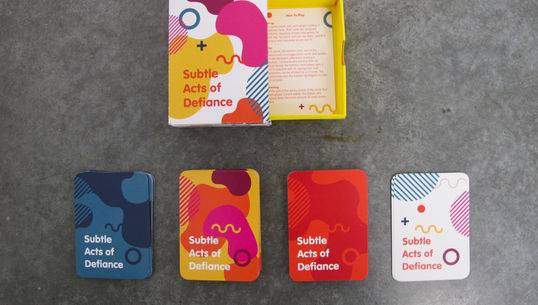Works
Flourish Our Youths
In collaboration with Funan Fina
External Partners:
-
Shumka Centre
-
InWithForward
-
Collingwood Neighbourhood House
Roles:
-
Researcher
-
Design Lead
-
Communication Designer
-
Facilitator
For immigrant youths, being in an unfamiliar and even hostile place can cause lower self-esteem, isolation from family and peers, disinterest in school, and a disposition to mental health issues. This is especially true for immigrants coming from poorer backgrounds. Social workers exert themselves to support this demographic through various recreational programs but fail to address the issue at its core. We believe through the design of fun and meaningful activities that teach anti-oppression and personal growth, we can support and create a lasting impact in the lives of newcomer youths.
Reconciling with Immigrant Identities and Feelings of Exclusion

In order to support young immigrants in their transition into Canadian society, we developed Flourish Our Youths, a workshop and toolkit that prompts the sharing of experiences, cultural empowerment and community for youth immigrants facing disconnect and isolation. It consists of two main components: a mask-making activity centred on identity and self-expression; and a collaborative card game about microaggressions to incite a conversation around racist experiences, learn our roles within them and how we can respond in a way that benefits everyone. With the help of a facilitator, the workshop attempts to point to the invisible systems of oppression that keep minorities and immigrants marginalized by unravelling the external and internalized oppression among youths.
Subtle Acts of Defiance
Microaggression Card Game
For immigrants and minorities, microaggressions are simply a fact of life. The aim of this game is to create a space to openly discuss and validate the subtle racist experiences of youth immigrants. The cards inform participants on the nature of microaggressions and provide them with the vocabulary to engage with these subtle racist acts more productively. The game unpacks deeply ingrained biases and attitudes in a fun and open environment. It gives youths the permission to speak up and stand up for themselves and for each other.
Through a facilitated role-play-based game, participants are prompted to think about their own experiences of microaggressions, the underlying messages behind these acts, how they impact individuals and what their own roles are during these situations.
Face It
Identity Mapping
Proceeding the card game, this mask-making activity asks participants to map the different aspects of their identity through a set of guided prompts. It helps immigrant youths to reflect on their past experiences, where they came from and whom they want to become. We want to nudge immigrant youths to look deeper within themselves, past the disconnected values that society imposes on them and hopefully, learn to find acceptance from within.
Coming from an Eastern value system and moving to Western society, youth immigrants go through a process of reconciling the differences in their cultures. It takes a long process of adjustment and rediscovering their identities in a new Western context to feel belonging among their peers again. Our goal is to help fellow immigrant youths reclaim their identity, take pride in their heritage and thrive in knowing their own value.


Immigrant youths participating in the Flourish Our Youths workshop at Collingwood Neighbourhood House, funded by the Shumka Centre within Emily Carr University













